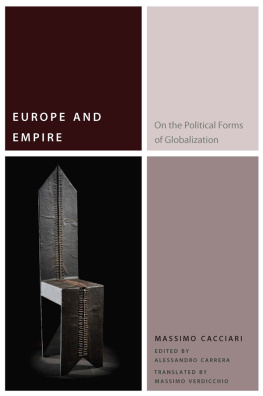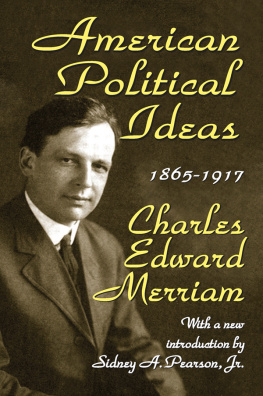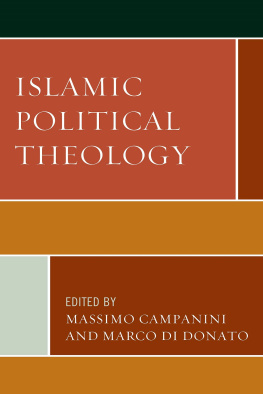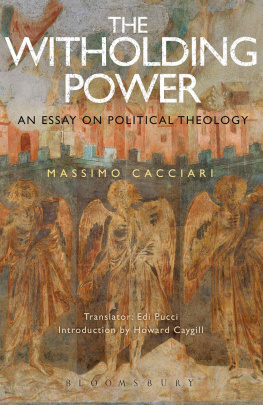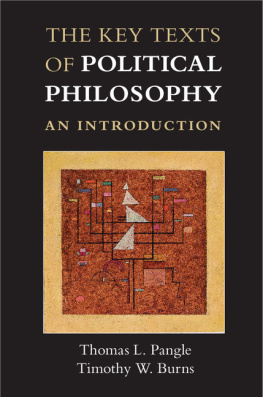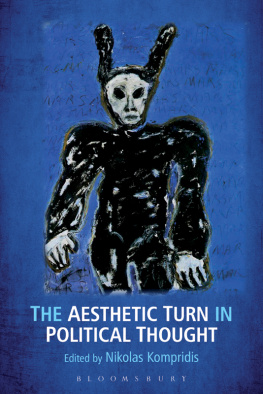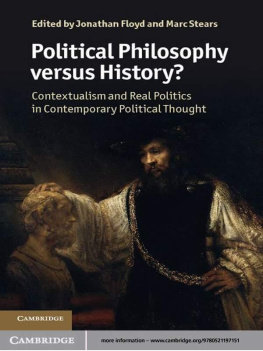THE UNPOLITICAL
The Unpolitical
ON THE RADICAL CRITIQUE OF POLITICAL REASON
MASSIMO CACCIARI
Edited and with an Introduction by Alessandro Carrera
Translated by Massimo Verdicchio

Copyright 2009 Fordham University Press
All rights reserved. No part of this publication may be reproduced, stored in a retrieval system, or transmitted in any form or by any meanselectronic, mechanical, photocopy, recording, or any otherexcept for brief quotations in printed reviews, without the prior permission of the publisher.
Fordham University Press has no responsibility for the persistence or accuracy of URLs for external or third-party Internet websites referred to in this publication and does not guarantee that any content on such websites is, or will remain, accurate or appropriate.
The editor wishes to acknowledge the financial support of the University of Houston GEAR (Grants to Enhance and Advance Research) in the editing process of this book, and the financial support of the University of Houston Small Grants Program in the publication of this book.
Library of Congress Cataloging-in-Publication Data Cacciari, Massimo.
The unpolitical : on the radical critique of political reason / Massimo Cacciari ; edited and with an introduction by Alessandro Carrera ; translated by Massimo Verdicchio.1st ed.
p. cm.
Includes bibliographical references and index.
ISBN 978-0-8232-3003-7 (cloth : alk. paper)
ISBN 978-0-8232-3004-4 (pbk. : alk. paper)
1. Political sciencePhilosophy.
I. Carrera, Alessandro, 1954 II. Title.
JA71.C23 2009
320.01dc22
200804715
Printed in the United States of America
11 10 09 5 4 3 2 1
First edition
CONTENTS
ALESSANDRO CARRERA
THE UNPOLITICAL
INTRODUCTION
On Massimo Cacciaris Disenchanted Activism
Alessandro Carrera
Negative Thought and the Autonomy of Politics
Massimo Cacciaris career is nothing short of impressive. Both an academic philosopher and a public figure who has devoted a significant part of his life to active politics, he is also one of the high-profile intellectuals in contemporary Italy. Born in Venice in 1944, Cacciari graduated in philosophy from the University of Padua with a dissertation on Kants Critique of Judgment. When he was twenty years old, he and literary scholar Cesare De Michelis started Angelus novus, an innovative journal that lasted from 1964 to 1966. Between 1968 and 1971 Cacciari coedited another journal, Contropiano: Materiali marxisti (Counterplan: Marxist Materials) with Alberto Asor Rosa, later an influential scholar and a leading literary critic. Between 1967 and 1969 Cacciari was close to the radical leftist movement Potere Operaio (Workers Power). In the early 1970s he abandoned his initial radicalism and in 1971 was appointed professor of history of architecture at the Architecture Institute of Venice; in 1985, he became professor of aesthetics in the same school. In 1976 he joined the Italian Communist Party and served as representative to the Italian Parliament from 1976 to 1983. In 1983 he abandoned his party militancy.
At the beginning of the 1980s, Cacciari began an intensive collaboration with two new journals, Il centauro (The Centaur, 19801985), and Laboratorio Politico (Political Laboratory, 19801985). Without neglecting his scholarly production, which culminated in his massive theoretical oeuvre, Dellinizio (On Beginning, 1990), Cacciari remained in the political arena. After 1989, the official left wing being still reluctant to accept the broad ideological changes made inevitable by the fall of the Berlin Wall, he decided to act at the grassroots level. For two electoral terms, from 1993 to 2000, Cacciari was elected mayor of Venice. During his mandate, he demonstrated that the philosopher could indeed rule the polis, winning the respect of the citizens and even of his political adversaries. In the meantime he founded another philosophical journal, Paradosso (Paradox), coedited with philosophers Sergio Givone, Carlo Sini, and Vincenzo Vitiello. In 1988, thinking that a federal reform of the Italian Constitution was the solution to the excessive centralization of the Italian government and bureaucracy, Cacciari coauthored a Federalist Charter that was supposed to anticipate and prevent the separatist tendencies of new political entities such as the Northern League and the Venetian League. He received little or no political support from the official left wing, where many career politicians were suspicious of his maverick position. With or without their endorsement, Cacciari became a major force in the so-called Movimento dei sindaci (Mayors Movement), a loose organization, or better, a forum, of one hundred Italian mayors who set out to convince the reluctant central government to give more political and fiscal autonomy to city councils. The year 2000 was another turning point in Cacciaris career. He resigned from his position as a representative in the European Parliament in Strasbourg and, still championing his federalist agenda, became a member of the Regional Council for the Veneto Region. In 2002, his decision to give up active politics came as a surprise to many. He accepted the position of dean of philosophy at the new Universit Vita-SaluteSan Raffaele in Cesano Maderno near Milan, where his aim was to create a school of high politics and to provide the Italian and European political scene with a new breed of public intellectuals and political scientists. In 2004, giving in to pressures from several Venetians, he accepted to run for mayor again, and he is now in his third term. He remains on the board of directors at San Raffaele University.
This busy mans bibliography is enormous: more than forty authored and coauthored books (several of them translated into all major European languages), and literally hundreds of articles, essays, interviews and journalistic pieces. Cacciaris range of scholarship has always ignored the boundaries of academic specialization. He has written with impressive competence, often breaking new ground, on Hegel, Novalis, Kierkegaard, Leopardi, Schopenhauer, Nietzsche, Simmel, Sombart, Wittgenstein, Hofmannsthal, Musil, Kafka, Kraus, Benjamin, Lukcs, Heidegger, Michelstaedter, Weil, and Jabs. A fine scholar of the aesthetics of architecture and the arts, he has published seminal essays on Adolf Loos, Otto Wagner, Pavel Florensky, and Marcel Duchamp. His works on political theory, ranging from Austrian Marxism to Max Weber, and from Walther Rathenau to Carl Schmitt, have challenged and continue to challenge the commonplaces of the postcommunist European Left. In his most ambitious theoretical books, Cacciari shows a masterful command of classical antiquity, Neoplatonism and Christian theology. In the 1960s and 1970s, he developed a new critique of classical idealism, based on the notion of negative thought, or antidialectic. During the 1980s, he investigated the nexus between philosophy, political theory, and theology, engaging the most prominent Catholic theologians to challenging debates. In the 1990s he laid the foundations for a new geophilosophy of Europe that has received much critical attention among professional philosophers, even though it failed to enter the political discussion the way it was intended. Many of Cacciaris works are far from being easily accessible to the reader who is not well learned in Greek and German literature and philosophy. Cacciari possesses a distinctive, polyglot, musical, and very dense style. No introduction, no didacticism. Cacciari plunges into the heart of his subject from the very first line. His early articles, published in the 1960s in


